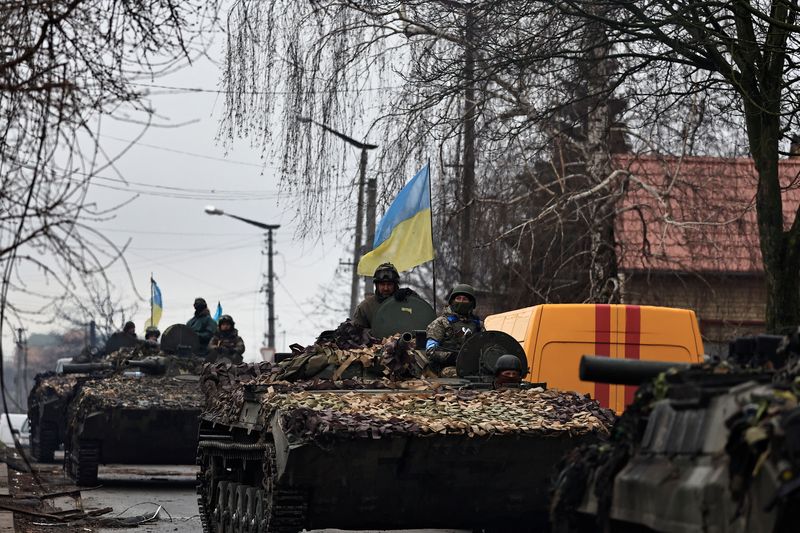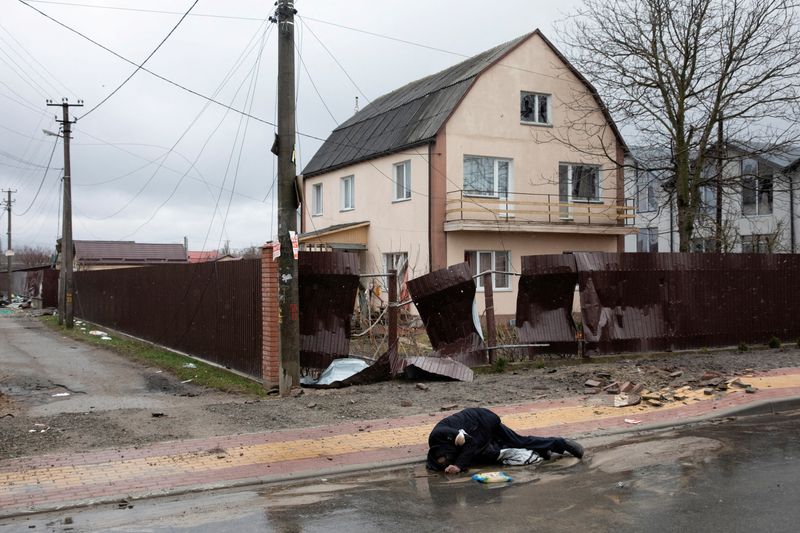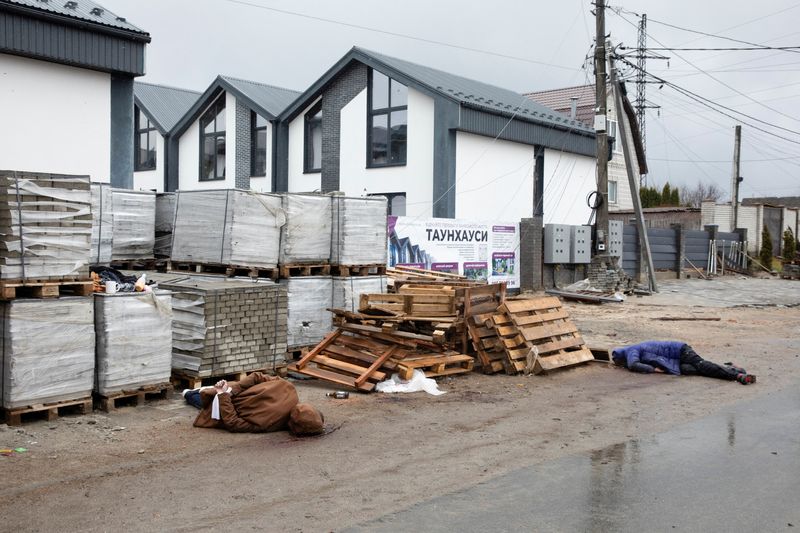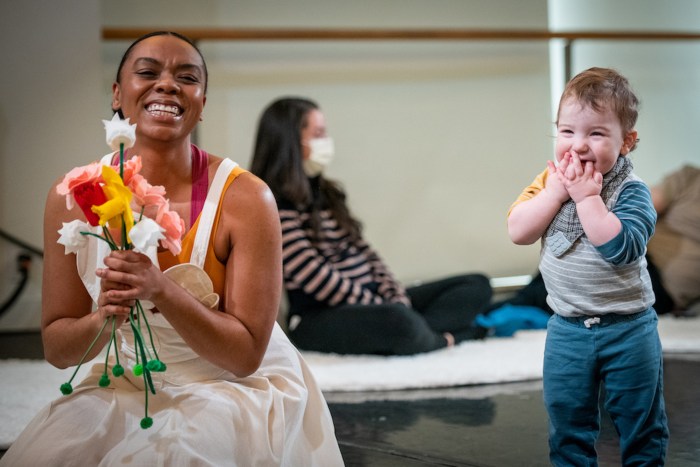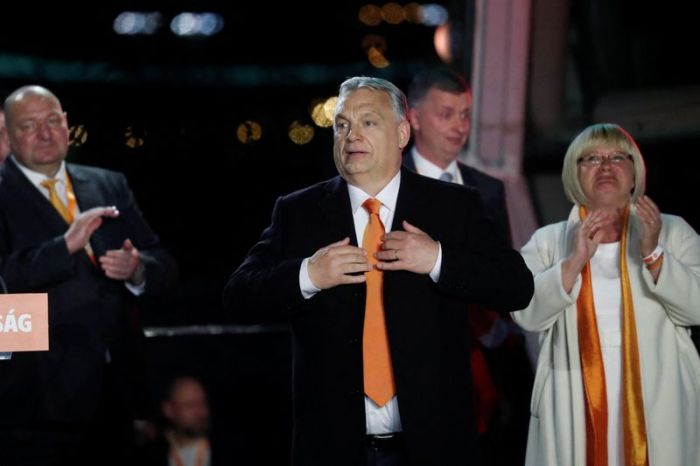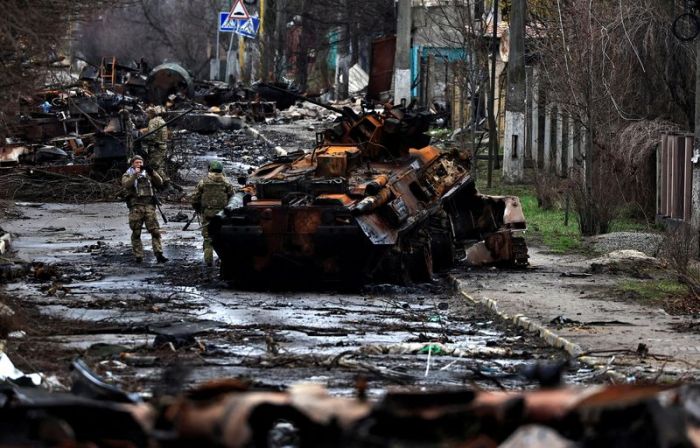BUCHA, Ukraine (Reuters) -The mayor of a recently liberated Ukrainian city accused Russian troops on Sunday of deliberately killing civilians during their month-long occupation of his town, allegations that Russia’s defence ministry denied.
The mayor of Bucha, Anatoliy Fedoruk, showed a Reuters team two corpses with white cloth tied around their arms which he said was what residents were forced to wear by fighters from Chechnya, a region in southern Russia that has deployed troops to Ukraine to support Russian forces.
One corpse had his hands bound by the white cloth, and appeared to have been shot in the mouth.
Russia’s defence ministry issued a statement on Sunday saying that all photographs and videos published by the Ukrainian authorities alleging “crimes” by Russian troops in Bucha were a “provocation.”
Bucha lies 37 km (23 miles) northwest of Kyiv city and this weekend when journalists visited and the authorities began making allegations of atrocities, it was a scene of shattered buildings and streets strewn with corpses.
“Any war has some rules of engagement for civilians. The Russians have demonstrated that they were consciously killing civilians,” Fedoruk said.
Fedoruk said on Saturday that more than 300 residents of the town had been killed.
Reuters, which was taken to the scene by Ukrainian authorities, was not immediately able to verify the mayor’s allegations.
Chechen leader Ramzan Kadyrov, a Putin ally, said in a statement on Feb. 26 that Chechen forces would be fighting in Ukraine as part of Russia’s special military operation, which was launched two days earlier.
Reuters was unable to determine if they operated in Bucha. A spokesman for Kadyrov did not immediately respond to a request for comment.
In its statement, the Russian defence ministry said further that “During the time that Russian armed forces were in control of this settlement, not a single local resident suffered from any violent actions”. It added that before Russian troops withdrew on March 30 they delivered 452 tons of humanitarian aid to civilians around the Kyiv region.
“For the entire time that the city was under the control of the Russian armed forces and, and afterwards, until today, in Bucha, local residents freely moved around the city and used cellular communications,” the ministry said.
On Saturday Ukraine said its forces had retaken all areas around Kyiv and that it now had complete control of the capital region for the first time since the Russian invasion began on Feb 24.
AFTERMATH
Bucha lies in a strategically significant cluster of towns on the northwestern outskirts of Kyiv, near Irpin and Hostomel military airport. It was captured in the days immediately after the invasion by Russian forces who swept south toward the capital.
Bucha and the northern outskirts of Irpin were the point at which the main body of Russian troops and armour advancing from the northwest was halted after meeting with unexpectedly fierce resistance from Ukrainian forces.
The area witnessed some of the bloodiest fighting for the capital, until Russia pulled forces back from north of Kyiv saying it planned to focus on eastern Ukraine.
On Saturday, Reuters journalists saw bodies in civilian clothes lying in the streets of Bucha or half-buried in the soil, Ukrainian soldiers took photos of each other next to incinerated Russian armoured vehicles.
Hands and other body parts could be seen poking out from the soil, while on the streets bodies lay beside the bicycles people had apparently been riding when they were killed.
Alexander Syrsky, the Ukrainian general in command of Kyiv’s defense, told reporters that the prosecutor’s office, police and other agencies were working to de-mine the areas from with Russians had withdrawn, to identify bodies and “to identify those who committed these crimes”.
Speaking at newly recaptured Hostomel airport, Ukrainian Defence Minister Oleksii Reznikov said on Sunday: “these are inhumans who simply committed crimes against civilians, raped, killed, shot them in the back of the head. The whole world needs to know about this”.
Reuters could not immediately verify his allegations.
The Kremlin denies that it has invaded Ukraine, saying it is carrying out a “special military operation” to degrade the Ukrainian armed forces and that it is targeting military installations rather than carrying out strikes on civilian areas.
WAR CRIMES INVESTIGATIONS
On Sunday the New York-based advocacy group Human Rights Watch (HRW) issued a statement saying it had found “several cases of Russian military forces committing laws-of-war violations” in Russian-controlled regions such as Chernihiv, Kharkiv, and Kyiv – citing Bucha as one location.
Russia’s defence ministry did not immediately respond to questions about the specific allegations in the HRW statement.
On March 1, asked about separate allegations of war crimes related to strikes on civilians, Kremlin spokesman Dmitry Peskov asserted in a conference call with reporters that the government categorically denied this. He dismissed allegations made the previous day by Ukraine’s ambassador to the United States of Russian strikes on civilian targets and the use of cluster bombs and vacuum bombs as fakes.
The International Criminal Court’s chief prosecutor, Karim Khan, said last month he had opened an investigation into possible war crimes in Ukraine but said it represents “myriad challenges, opportunities and difficulties”. Several legal experts said a prosecution of President Vladimir Putin or other Russian leaders would face high hurdles and could take years.
(Reporting by Simon Gardner, Sergiy Karazy, Zohra Bensemra and Herbert Villaraga in BuchaAdditional reporting by Stephen Farrell in Lviv and Guy Faulconbridge and Tom Balmforth in LondonEditing by Elizabeth Piper and Frances Kerry)

